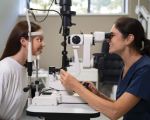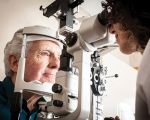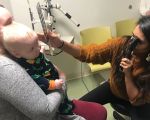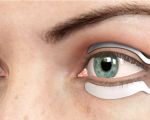
Understanding the Importance of Proper Contact Lens Care
When I first started wearing contact lenses, I had no idea how important it was to take care of them. My lenses were just a simple solution to my vision problems, but soon I realized that improper care could lead to discomfort, irritation, and even serious eye infections. That's why I'm here to share what I've learned about the crucial steps to properly care for your contact lenses, ensuring both your comfort and eye health. Whether you're a seasoned lens wearer or just starting out, these tips will help keep your eyes safe and your lenses in top condition.
1. Keep Your Hands Clean and Dry
The first and most essential step in caring for your contact lenses is making sure your hands are clean before you touch your lenses. This may sound like a no-brainer, but it's easy to forget the importance of washing your hands thoroughly with soap and water. I learned the hard way after a couple of times when I accidentally transferred bacteria from my hands to my lenses, causing irritation and redness. Always wash and dry your hands with a lint-free towel before handling your lenses.
2. Clean and Disinfect Your Lenses Regularly
One of the most critical aspects of contact lens care is cleaning and disinfecting them regularly. I’ve always been told to never skip this step, and it’s true. Bacteria and debris can build up on your lenses, leading to discomfort and potential infections. Use a high-quality contact lens solution that is designed for your lens type, and follow the manufacturer's instructions on how to clean and disinfect them. I typically clean mine every night, soaking them in solution until I put them back in the morning. Remember, never use water or saliva to clean your lenses – they can contain harmful microorganisms.
3. Use the Right Contact Lens Solution
Choosing the right lens solution is essential to keeping your lenses clean and your eyes healthy. There are many different types of solutions available, including multipurpose solutions, hydrogen peroxide-based solutions, and saline solutions. I personally prefer multipurpose solutions because they are convenient and effective for cleaning, rinsing, and storing lenses. However, some people with sensitive eyes might benefit from hydrogen peroxide-based solutions, which are known for their disinfecting power. It's important to check with your eye doctor to make sure you're using the best solution for your eyes and lenses.
4. Never Sleep in Your Contact Lenses
When I first got my contact lenses, I thought it would be convenient to just sleep in them and save time in the morning. However, I quickly learned that this is one of the biggest mistakes you can make with your lenses. Sleeping in your lenses reduces oxygen flow to your corneas and increases the risk of developing eye infections. Even if your lenses are designed for extended wear, it's still important to give your eyes a break and remove them before going to sleep. Trust me – your eyes will thank you for it!
5. Replace Your Contact Lenses as Recommended
Each type of contact lens has a recommended replacement schedule, and it’s crucial to follow it. Some lenses are designed for daily use, while others can be worn for longer periods, like weekly or monthly lenses. I made the mistake of wearing my lenses longer than recommended once, and I experienced irritation and blurred vision. Replacing your lenses as recommended helps prevent the buildup of bacteria and other harmful substances, keeping your eyes healthy. Be sure to keep track of the replacement dates for your lenses, and don’t try to extend their use beyond the recommended period.
6. Store Your Lenses Properly
Proper storage of your contact lenses is another important aspect of their care. Always store your lenses in a clean, dry lens case and make sure it’s filled with fresh contact lens solution, not old or used solution. I learned the hard way that using old solution or keeping lenses in a dirty case can lead to bacterial growth, which can seriously affect your eye health. Clean your lens case regularly and replace it every few months to avoid contamination.
7. Be Mindful of Your Eyes' Health
As someone who wears contact lenses, I’ve realized that taking care of your lenses goes hand in hand with taking care of your eyes. If you experience discomfort, redness, or any unusual symptoms, remove your lenses immediately and consult with your eye care professional. Never ignore any signs that something might be wrong, even if it’s just a little irritation. Regular eye exams are also essential to monitor the health of your eyes and to ensure that your prescription is up to date.
8. Take Breaks from Contact Lenses
As much as I love the convenience of wearing contact lenses, I’ve found that taking breaks from wearing them is just as important. Giving your eyes time to rest and breathe is crucial. This is especially important if you work in front of a computer for long hours or if you experience dryness or discomfort while wearing your lenses. I make it a habit to wear my glasses a few days a week to give my eyes a break. Your eyes will thank you for it!
9. Avoid Using Expired or Damaged Contact Lenses
Another mistake I’ve learned to avoid is using expired or damaged contact lenses. Expired lenses lose their effectiveness and can become a breeding ground for bacteria. If you notice any damage, like tears or cracks, don't try to wear the lenses. It’s better to replace them than risk your eye health. Always check the expiration date before using your lenses and inspect them carefully for any visible damage.
10. Know When to Seek Help
Finally, it’s essential to know when to seek professional help. If you experience persistent discomfort, pain, or vision changes, it's time to contact your eye doctor. I’ve had a few instances where I ignored symptoms, thinking they were minor issues, only to discover that I had a serious eye infection. Your eye health is precious, and seeking prompt medical attention can help prevent long-term damage.








